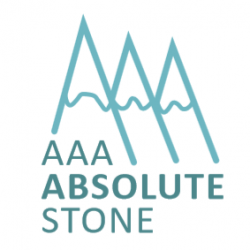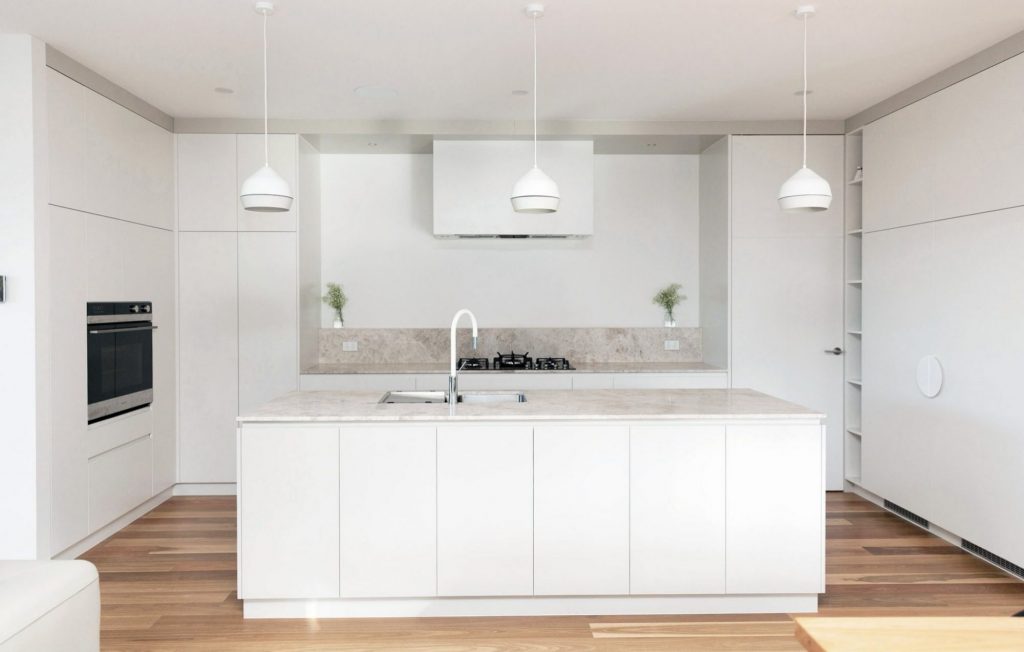Engineered stone is composed of quartz particles and a highly specialised resin. The process of manufacturing engineered stone for kitchen countertops starts when raw crystals of natural stones, particularly quartz and marble, with sizes that range from coarse grains to rock salt size, are gathered. Once the natural stone crystals are selected and ground, they are mixed and blended with bonding agents and colour. Most manufacturing procedures make use of 5 to 10% resin as a bonding agent to add to the crushed natural stones. The mixture is heated and undergoes a process called vibro-compaction to form a solid and impenetrable surface.
The vibro-compaction process produces many large slabs of engineered stone. Most engineered stone slabs are composed of 93% quartz and 7% resin pigments and binders. They are free from cracks and fissures. They are also resistant to moisture, water, heat, and bacterial growth.
Ideally, all engineered stone counter tops should be made up of 93% quartz to be durable, hard, and impermeable. Meeting this requirement can produce a product that is extremely durable, nonporous, less likely to crack or break during fabrication, and up to four times as strong as a granite product.
Ideal for: kitchens, splash backs, vanities, laundries, counter tops/reception desks, bar tops, staircases and shower / bathroom wall lining.
Engineered stone is stain, scratch and heat resistant. However it is not completely stain scratch or heat proof. Therefore following the correct care and maintenance guidelines will ensure your engineered stone maintains its good looks for many years.
Care & Maintenance
Engineered stone is extremely low maintenance unlike granite & marble, sealer is not required.
Everyday Cleaning
We recommend using warm water & a mild detergent with a damp soft cloth or a non-scratch cleaning pad or sponge. Liquid spills such as fruits, vegetables, food colouring, curries etc, should be wiped up and cleaned immediately.
For further cleaning we recommend using Lithofin products. Please see the link below to order products directly to your address. https://www.lithofin.com/en-au/
Alternatively, please visit the suppliers individual websites for their recommended care and maintenance of their materials. Websites located on the “Suppliers Tab” in the main menu.
Prevent Damage
- Trivets & heat pads should be used when placing cookware such as hot pots, saucepans or any heat generating appliance on the surface
- Engineered stone has been designed to be resistant to heat and can withstand exposure to moderately hot temperatures without damage, however excessive localized heat, whether prolonged or sudden may result in thermal shock.
- There are some strong chemicals and solvents that can cause damage to your engineered stone, such as, paint remover, paint and stain strippers, nail polish removers, bleach, furniture cleaners, oil soaps, citric acids, permanent markers or inks, oven cleaners, drain cleaners and chemicals with a high alkaline ph levels are examples of products that could affect the surface. If any strong chemicals or solvents come in contact with your bench top, rinse immediately with plenty of water, then follow with normal cleaning procedures.
- Avoid excessive weight being placed on your bench top such as trades people standing on your bench top.
- Although quartz is quite hard, it can be easily chipped if hit with a hard object. We perform repairs that are nearly invisible at an extra cost, as this is not covered under the suppliers limited warranties.
- It is not recommended for outdoor use where it is in contact with direct sunlight as the heat can discolor and warp the stone.
Stone with Shells
This unique product combines shells with fine grain quartz. Because of the introduction of these shells, the areas where the shells are embedded on the surface of the products may be susceptible to staining and possibly react to vinegar, citric and other acids, as the shells are made up of calcium carbonate.
For more information plus their full range of products please see the “suppliers tab” in our main menu for links to our current stockists.
Silica Information
Please be informed we take safety precautions regarding silica very seriously. All our team members manufacture with water in order to keep the dust particles to a minimum.
All our team members have been fitted with their own masks to provide extra protection against silica dust. We also have our team members book in annually for lung CT tests in order to monitor their health.
We follow the current guidelines for silica dust exposure so please rest assured we are doing all we can to keep everyone safe.
Customers are not at risk of exposure of silica dust from their benchtops as the risk is mainly during manufacture, when cutting the Engineered stone.
Engineered stone is among just one of the materials containing silica. Other materials containing silica are concrete, glass, sand and dirt, just to name a few.
Engineered stone has been heightened in the media recently but we would like to point out that our Engineered Stone Suppliers are trying to accommodate with low silica material (less than 40% for most – then Cosentino’s Dekton range with 11%) which is significantly less than the original high silica materials. They are also slowly transitioning to Zero% silica products mid 2024.
If you have any further questions regarding the safety with Engineered stone, please do not hesitate to contact us on 02 6299 5225, we would be happy to discuss any concerns and provide reassurance.


